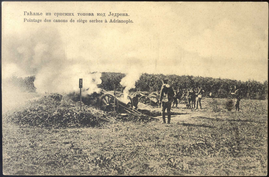Siege of Adrianople (1912–1913)
| Battle of Adrianople | |||||||
|---|---|---|---|---|---|---|---|
| Part of First Balkan War | |||||||
 Siege of Adrianople | |||||||
| |||||||
| Belligerents | |||||||
|
|
| ||||||
| Commanders and leaders | |||||||
|
|
| ||||||
| Strength | |||||||
|
106,425 Bulgarians (424 cannons);[1] 47,275 Serbs (62 cannons, 34 howitzers)[2] | 75,000[1] 60,000[3] | ||||||
| Casualties and losses | |||||||
|
Bulgarians: 1298 killed, 6,655 wounded[1] Serbs: 453 killed, 1,917 wounded[4] |
ca. 7,000 killed, Captured: 65,000 soldiers, 15 generals, 2,000 officers, 600 cannons, 16 flags [1][5] | ||||||
The Battle or Siege of Adrianople or Siege of Edirne (Template:Lang-bg, Template:Lang-sr, Template:Lang-tr) was fought during the First Balkan War, beginning in mid-November 1912 and ending on 26 March 1913 with the capture of Edirne (Adrianople) by the Bulgarian 2nd Army.
The victorious end of the siege was considered an enormous military success because the defenses of city were carefully developed by leading German siege experts and were dubbed 'undefeatable'. The Bulgarian army, after 5 months of siege and two bold night attacks, took the Ottoman stronghold.
The victors were under the overall command of General Nikola Ivanov, and the commander of the Bulgarian forces on the Eastern sector of the fortress was General Georgi Vazov, brother of the famous Bulgarian writer Ivan Vazov and General Vladimir Vazov.
One of the first known uses of an airplane for bombing took place during the siege: the Bulgarians dropped special hand grenades from one or more airplanes in an effort to cause panic among Turkish soldiers. Many young Bulgarians Officers and Professionals took part in this decisive battle of the First Balkan War, later played important roles in the politics, culture, commerce and industry of Bulgaria[citation needed].


The final battle consisted of two night attacks. Preparations for the battle included covering all metal parts of the uniforms and weapons with tissue, in order to eliminate any shine or noise. The several armies that took part in the siege were put under joint command, creating a prototype of a front. Some light artillery pieces towed by horses followed the advancing units, playing the role of infantry support guns. Attempts were made to perturb all Ottomans' radio communications to isolate and demoralize the besieged. Beginning on March 24, 1913 the external fortifications were captured in one night, and in the next night the fortress itself fell into Bulgarian hands. Early in the morning of March 26, 1913 the commander of the fortress, Mehmed Şükrü Paşa, surrendered and thus ended the siege of Adrianople. After the surrender large parts of the city, especially the house of the Muslims and the Jews were subjected to looting for three days long, though it's disputed who actually carried out the looting, with some accounts accusing mainly the Bulgarian army and other sources accusing the local Greek population.[6] The Turkish prisoners of war were badly treated and some of them killed.[7] According to the Carnegie report there were made two principal charges on the Bulgarians:
- 1 - they behaved with great cruelty and brutality toward the Ottoman prisoners of war.
- 2 - the Bulgarian authorities permitted the pillaging of the property of Edirne's Turkish population for three days after the city's surrender.[8]
The Bulgarian achievements up to this point were fairly summarized by a British war correspondent: "A nation with a population of less than five million and a military budget of less than two million pounds per annum placed in the field within fourteen days of mobilization an army of 400,000 men, and in the course of four weeks moved that army over 160 miles in hostile territory, captured one fortress and invested another, fought and won two great battles against the available armed strength of a nation of twenty million inhabitants, and stopped only at the gates of the hostile capital. With the exception of the Japanese and Gurkhas, the Bulgarians alone of all troops go into battle with the fixed intention of killing at least one enemy."
Serbian units involved were the 2nd army under command of general (later vojvoda, equivalent to Field Marshal) Stepa Stepanović (two divisions and some support units) and heavy artillery (38 siege cannons and howitzers of 120 and 150 mm purchased from French Schneider-Canet factory in 1908) dispatched because the Bulgarians lacked heavy artillery (though they were well supplied with Krupp-designed 75 mm field artillery).
The loss of Edirne delivered the final decisive blow on the Ottoman army and brought to a close the First Balkan War.[9]
See also
- Zang Tumb Tumb, a poem about the battle
External links
- David Johnson (1997). "Splendid Fellows, Splendidly Led". Military History magazine (vol. 14 issue 3). Archived from the original on 2001-08-22. Retrieved 2007-06-02.
{{cite web}}: Italic or bold markup not allowed in:|publisher=(help); Unknown parameter|month=ignored (help)
Footnotes
- ^ a b c d ЦВА, ф. 48, оп. 1, а, е. 3, л. 86; а. е. 5, л. 205-206; Иванов, Н. Балканската война... с. 332-335
- ^ Alexandar Vachkov: The Balkan War 1912-1913, p.124
- ^ Dictionary of Battles and Sieges: A-E, Tony Jaques, page 12, 2007
- ^ Jaša Tomić: Rat u Maćedoniji i Bugarskoj, p. 75
- ^ Николета Николова. "Одринската епопея — венец на българската войнска слава". Archived from the original on 2007-06-29. Retrieved 2008-05-27.
- ^ Jews, Turks, Ottomans: a shared history, fifteenth through the twentieth century, Avigdor Levy, page 187, 2002
- ^ Jews, Turks, Ottomans: a shared history, fifteenth through the twentieth century, Avigdor Levy, page 187, 2002
- ^ Jews, Turks, Ottomans: a shared history, fifteenth through the twentieth century, Avigdor Levy, p.186
- ^ Monroe, Will Seymour. "'Bulgaria and her people : with an account of the Balkan wars, Macedonia, and the Macedonia Bulgars (1914)'" (PDF).
{{cite web}}: Text "4" ignored (help)page 114
